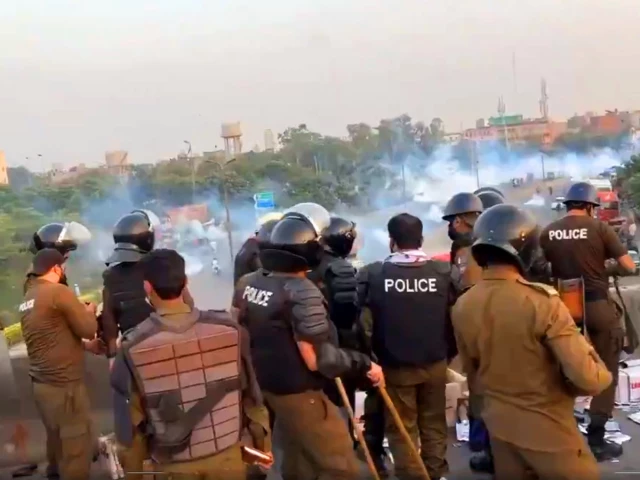Punjab minister says dozens of bank accounts frozen; Home Minister Naqvi meets academics in Karachi
Clash between police and TLP workers paralyzes life in Lahore on Friday. Screenshot of Express footage
LAHORE/KARACHI:
The Punjab government on Tuesday intensified its crackdown on Tehreek-e-Labbaik Pakistan (TLP) and its supporters, freezing dozens of bank accounts, confiscating properties and placing hundreds of mosques and seminaries under government control.
At the same time, Interior Minister Mohsin Naqvi said in Karachi that federal measures are being taken only against those who are armed, not against any particular religious group. He said the government would not interfere in the affairs of mosques or seminaries.
Punjab Information Minister Azma Bokhari, at a news conference in Lahore, said 95 bank accounts linked to TLP chief Saad Rizvi had been frozen, while another 3,800 domestic and international accounts used to finance the group were under investigation.
“Those who finance the TLP will face terrorism charges,” he warned, adding that the Punjab cabinet had approved a summary seeking to ban the group, which is now before the federal government for final action expected within days.
The minister said well-educated people had been found supporting the group’s activities and that the government would not tolerate “anyone who uses religion to fuel unrest.”
He revealed that authorities had recovered 1.92 kilograms of gold, 898 grams of silver, 69 branded watches and cash worth over Rs 144 million during a raid on Rizvi’s residence. Police also recovered foreign currency, including Indian rupees, Saudi riyals and UAE dirhams, along with jewelery worth Rs 63 million.
Bokhari confirmed that no order had been issued to relocate the grave of TLP founder Khadim Hussain Rizvi, calling such rumors on social media “false and politically motivated”. However, he warned that no one would be allowed to use the grave as a rallying point for fundraising or incitement.
He added that 130 mosques previously under the influence of the TLP had been taken into state custody and 223 madaris geotagged. “These mosques will remain open for prayers, but any political activity or provocative speeches will not be tolerated,” he said. Six of the seminaries, he noted, were built on state-owned land and will be given to moderate Sunni scholars.
The minister condemned the TLP’s recent ‘Gaza March’, which defied Section 144 and sparked violent clashes in Muridke, leaving one police officer martyred, three protesters dead and dozens injured. “It is tragic that the riots are justified in the name of Islam and Palestine,” Bokhari said. “This is manipulation.”
In Karachi, Interior Minister Mohsin Naqvi reiterated that the federal government was not targeting any specific organization. “Action will be taken against anyone who is armed, not against any particular group,” he said at a joint press conference with Sindh Governor Kamran Tessori and MQM-Pakistan President Khalid Maqbool Siddiqui.
Naqvi emphasized that Prime Minister Shehbaz Sharif and Field Marshal Asim Munir were working diligently to restore peace and stability. “We are achieving results; what we need most now is unity,” he said.
Governor Tessori said Naqvi was actively involved in ensuring peace and supervising the operation against Fitna al-Khawarij (Kharijite evil). He added that the Karachi and Hyderabad issues were being discussed and described the minister’s cooperation as “exemplary”.
The minister later met Mufti Muneebur Rehman and other Sunni scholars, assuring them that the government would not interfere in religious institutions. He promised transparency in investigations related to the Muridke incident and said details about the victims and affected families would be shared.
In a statement, Mufti Abdul Razzaq Naqshbandi, spokesperson for Mufti Muneebur Rehman, said both sides discussed the Muridke incident and its consequences. “The ulama presented their stand on multiple issues and the minister promised resolution of all issues. It was agreed that a detailed session would be held in Islamabad to address legitimate concerns,” he said.
Bokhari, meanwhile, warned that those who incite online violence through platforms such as WhatsApp and Facebook would face terrorism charges, adding that offenders would be denied admission to universities, visas and other state facilities. “We don’t want pressure groups to emerge in Pakistan,” he said. “Anyone who conspires against peace and stability will face the full weight of the law.”
He concluded by calling on parents to keep their children away from radical elements. “Your children were not born to become anyone’s cannon fodder,” he said.




